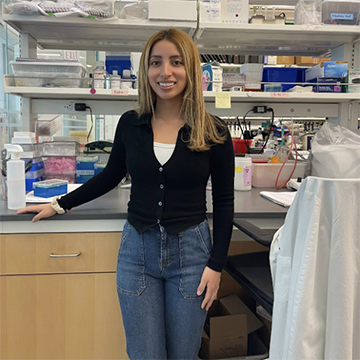From SIP to SPEED: Leslei Lopez’s Path Toward a Neuroscience Research Career
Leslei Lopez, a graduate student in Biology at Northeastern Illinois University (NEIU), joined Northwestern’s Science Immersion Program in the summer of 2024 with a strong interest in neuroscience and an ambition to broaden her research experience. What she gained was even more impactful. Supported by the Northwestern University Clinical and Translational Sciences (NUCATS) Institute, the program instilled in Lopez the confidence to take ownership of her research path and solidified her interest in pursuing a career in neuroscience and medicine.
That path led her to the SPEED Graduate Research and Career Accelerator Program at NEIU, an initiative designed to support graduate students through funding and professional development opportunities. With SPEED support, Lopez is continuing her investigation into mitochondrial disorders, building on the work she began at Northwestern, and gaining valuable mentorship resources that are preparing her for the next stage of her academic and scientific career.
Lopez first pursued her research interests while earning a bachelor’s degree in Neuroscience at the University of Illinois at Chicago. It was there she investigated the correlation between Alzheimer’s Disease and the long-term effects of COVID-19: “This was my first exposure to wet lab research,” Lopez says. “It sparked my curiosity about the causes and mechanisms of neurological disorders.”

My summer at Northwestern provided an incredible foundation. Not only did I gain technical skills in data analysis and scientific communication, but I also learned to apply scientific literature to my own research.”
The experience at Northwestern gave Lopez the opportunity to continue that journey, this time with a focus on mitochondrial disorders. Working in the Chandel Lab under the mentorship of Divakar Mithal and Britta Kuusik, she investigated how deleting NDUFS4, a subunit of Complex I in GABAergic neurons, affects mitochondrial function and neuronal health.
“My summer at Northwestern provided an incredible foundation. Not only did I gain technical skills in data analysis and scientific communication, but I also learned to apply scientific literature to my own research and strengthen my critical thinking skills,” Lopez says. She credits the program’s structure, including biweekly meetings and mentorship from PhDs and MDs, with fostering her ability to lead her own research and communicate findings clearly.
The experience culminated in Lopez’s presentation of a scientific poster, the first in her academic career, and a sense of readiness for the next step—which came in the form of the SPEED Graduate Research and Career Accelerator Program at NEIU.
“Receiving SPEED funding means so much to me,” Lopez says. “It gives me the time and resources to fully focus on advancing our research, take on more responsibility, and continue growing as a scientist.”
With the support of SPEED, Lopez will continue her mitochondrial research under the guidance of Professor Voisine, with funding for the summer of 2025 and the potential for an extension into the fall term. The program also includes career development workshops and funding for travel or research supplies.
“I’m incredibly grateful to have been part of both the SIP and now the SPEED programs,” Lopez says. “They’ve given me the confidence to pursue research more seriously and have helped shape a clearer path toward my long-term career goals in neuroscience and medicine.”
Lopez’s story is a notable example of how the program at Northwestern, designed to provide meaningful research experiences to students from all backgrounds, can catalyze scientific careers.
“I hope to contribute meaningful work to my field and inspire other students to explore research opportunities and follow their passions,” Lopez says. “It’s incredibly motivating to know there’s a strong community at Northwestern that believes in and supports student researchers.”
Written by Alex Miranda




